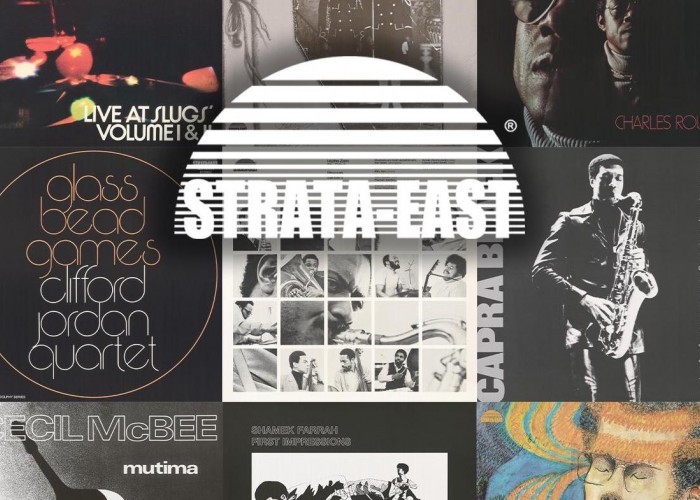Jan 13, 2026 2:09 PM
More Trump-Kennedy Center Cancellations
The fallout from the renaming of the John F. Kennedy Center for the Performing Arts to include President Donald…

The first vinyl releases from the rejuvenated Strata-East Records are out, with more to come.
(Photo: Courtesy Mack Avenue Records)The first vinyl releases from the recently rejuvenated Strata-East Records remind us how persuasive and powerful jazz from the 1970s could be. The greatest challenge in revisiting these memorable discs is ranking them, but it’s a welcome task.
Founded in 1970 by trumpeter Charles Tolliver and pianist Stanley Cowell, New York-based Strata-East was dedicated to inspiring both the artists it released and an audience eager for jazz of a spiritual bent. Early this year, Mack Avenue Music Group entered into an alliance with Strata-East. The first fruit of that pact is the release of four albums. The presentation and packaging are as heavy duty as the audiophile LPs themselves: This music is built to last. (Strata-East: The Legacy Begins, a sampler of the label, is digital only.)
Just how sturdy and daring Strata-East music is becomes clear from the start of Stanley Cowell’s remarkable 1974 solo album Musa: Ancestral Streams (Strata-East; ★★★★★ 57:24). A recording to get lost in, Musa spans the rubato boogie-woogie of “Abscretions” (not a musical oxymoron for Cowell), the restful and majestic “Maimoun” and “Departure No. 1,” an insanely fast work. Cowell enjoys puzzling out stunning lines so fast and furious there’s no time to dwell on them. A virtuoso at the level of Phineas Newborn or Oscar Peterson, Cowell channels the history of jazz when he plays.
Cowell also is key to Charles Tolliver’s Music Inc., Live At Slugs’ Volume I and II (Strata-East; ★★★★★ 1:35:41), recorded in 1970 at a legendary New York club. There’s no fat on this beautifully produced double album. Standout tracks include Tolliver’s blazing lines on his tune “Spanning” and Cowell’s ”Orientale,” which takes up one side of this double album. Tolliver launches it large, with full vibrato. He lays back as Cowell leans in, swirly and driving. Drummer Jimmy Hopps and bassist Cecil McBee are low-key, detonating when the tune calls for it. Tolliver takes “Orientale” out on trills and repeated notes, ascending only to return to Earth to worry it more. It finally subsides, the group’s passion spent. A stirring track — and the longest on all four sides. The set concludes with “Our Second Father,” Tolliver’s tribute to John Coltrane. After Tolliver’s brief introduction, Cowell builds a solo and McBee and Hopps heat up, opening the door to Tolliver, who plays with great bravado, scaling the heights of his horn in triumphant fashion.
The influence of Coltrane also looms over Pharoah Sanders’ Izipho Zam (My Gifts) (Strata-East; ★★★★ 50:13). Recorded in 1969 and released in 1973, this is sweeping and ceremonial. It starts with “Prince Of Peace,” a group chant with Leon Thomas on ululating, yodel-like vocals. A florid piano solo by Lonnie Liston Smith adds to the tune’s exultant mass. There is plenty of Sanders on “Balance,” the album’s most cohesive tune. This raucous plunge into funk finds Sanders in conversation with other disrupters, alto sax man Sonny Fortune and guitarist Sonny Sharrock. The intrusive, joyous track features middle-register Sanders at full strength and a shape-shifting rhythm section. A weird, pungent piece that keeps you off guard, it’s ultimately liberating — and healing, given the then-recent assassinations of Martin Luther King Jr. and Robert F. Kennedy. A strong, pure expression, the piece doesn’t end so much as expire. Side B is dedicated to the title track, almost a half-hour of Sanders conjuring an atmosphere that chirps and rustles but also feels decidedly urban. It’s abstract jazz as played by a jam band, replete with dazzling percussion (there are at least three drummers), penetrating saxophones and power. This track doesn’t want to end, and we don’t want it to.
A less militant if no less absorbing musical expression comes from Charles Rouse’s 1974 Two Is One (Strata-East; ★★★★★ 40:19), an album long on funk and groove that confirmed Rouse as a leader after spending most of the 1960s as Thelonious Monk’s key sideman. Rouse takes charge immediately on guitarist George Davis’ “Bitchin’,” a sinuous foray that spotlights Rouse’s smooth, inviting style. Joe Chambers’ “Hopscotch” extends the tension as Rouse captains this taut, jittery tune. The catholicity of style and the warmth of the players distinguish Two Is One. The title is based on a concept Rouse borrowed from Monk. The idea is that people can get to know each other so well they’re of one mind. It’s said that Rouse and Monk used to finish each other’s sentences. It takes that kind of meld to play Rouse’s title track, with three different tempos going at once. DB
Ordering info: strata-east.bandcamp.com

Belá Fleck during an interview with Fredrika Whitfield on CNN.
Jan 13, 2026 2:09 PM
The fallout from the renaming of the John F. Kennedy Center for the Performing Arts to include President Donald…

Peplowski first came to prominence in legacy swing bands, including the final iteration of the Benny Goodman Orchestra, before beginning a solo career in the late 1980s.
Feb 3, 2026 12:10 AM
Ken Peplowski, a clarinetist and tenor saxophonist who straddled the worlds of traditional and modern jazz, died Feb. 2…

The success of Oregon’s first album, 1971’s Music Of Another Present Era, allowed Towner to establish a solo career.
Jan 19, 2026 5:02 PM
Ralph Towner, a guitarist and composer who blended multiple genres, including jazz — and throughout them all remained…

Rico’s Anti-Microbial Instrument Swab
Jan 19, 2026 2:48 PM
With this year’s NAMM Show right around the corner, we can look forward to plenty of new and innovative instruments…

Richie Beirach was particularly renowned for his approach to chromatic harmony, which he used to improvise reharmonizations of originals and standards.
Jan 27, 2026 11:19 AM
Richie Beirach, a pianist and composer who channeled a knowledge of modern classical music into his jazz practice,…